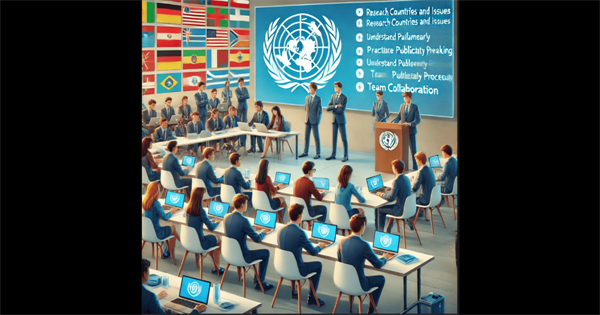
How to Train for Model United Nations
Model United Nations or MUN is one of the extra curriculum activities whereby students can learn about foreign relations, speaking, and diplomacy at an international level. Good training enables a person to get all he/she requires to perform well in MUN conferences. Structured training helps delegates learn how to do study, argue, negotiate, and find solutions to tough global issues.
Learning the Rules of Procedure
First, students need to understand what Model United Nations is and how it works. Learn how to follow the rules of government during debates. Go through mock meetings to get better at making gestures and points. Learn about different kinds of debates, such as caucuses that are controlled and those that are not. Learn the everyday words and phrases that members use at MUN. Knowing these rules helps you focus on the content of conferences instead of the rules themselves.
Gain Research Skills
MUN performance is built mostly on solid research. Read UN resolutions, papers, and documentation carefully. Look into the foreign policy views and voting history of the country you were given. Get solid figures and data to back up your points of view. Write in-depth position papers that explain your country's view. Keep up with recent events that are related to what you are studying. Conducting thorough study empowers you to speak with authority and negotiate skilfully.
Develop Your Capacity for Public Speaking
Great speakers are able to speak in public with confidence. Get better at speaking without notes. Change your voice, speed up or slow down, and make eye contact more often. When you talk at Model United Nations, use formal, diplomatic words. Boost your confidence by giving talks on the spot about anything. Watch yourself talk and examine areas that might use development. Frequent practice helps one overcome speech anxiety.
Acquire Negotiating Strategies
MUN success mostly relies on negotiating techniques. Practise establishing common ground with someone who disagrees. Get together with other people and form vote blocs. Practice finding middle ground and reaching agreements. Learn how to create amendments fit for several parties. When there are no moderators, use casual politeness during caucuses. Explore real-life UN negotiation tactics to gain knowledge.
Write Clear Resolutions
One absolutely vital Model United Nations ability is resolution writing. Examine UN resolution's rigorous structure. Learn how to write operative and preambulatory phrases. You should learn how to combine several writing papers into one. Learn how to make changes from top to bottom. Use specific, doable answers instead of generalisations. Don't leave any room for confusion by using clear, precise wording.
Work on Crisis Management
MUN often throws in surprises that require quick thinking. Practise how to react when unexpected things happen in exercises. Learn how to change your plan during an argument if things go wrong. Take on aggressive questions well while remaining polite. You need to find solutions that satisfy a lot of different goals. Learn how to stay relaxed when things get tough.
Master Control of Time Management
Effective time management is key to a successful meeting. Get used to talking for short amounts of time. Figure out how to do good study before a conference. Take part in both official and informal debates in equal amounts. Make it a priority to form important relationships early on. You need to plan your time well between writing resolutions and getting help. Plan calculated actions instead of talking at every chance.
Conclusion
Dedication and regular practice are needed for MUN training to work. Make sure you have a solid understanding of procedures, study, and public speaking. Learn useful skills like how to negotiate, write a resolution, and handle a problem. Don't forget that every meeting gives you the chance to learn new things and get better. You can become a good Model United Nations member if you plan your work and practise regularly.
FAQ
How to prepare for Model United Nations?
Research your nation, comprehend the agenda, compose a position paper, rehearse speeches, and become familiar with the fundamentals of UN protocol to get ready for MUN.
How to get into Model United Nations?
To gain experience and confidence, join MUN by joining your school or local club, selecting a committee, learning the fundamentals, and going to conferences.
Related Blogs
-
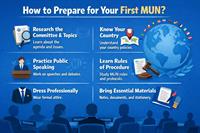
19-Jan-2026 How to Prepare for Your First MUN?
-
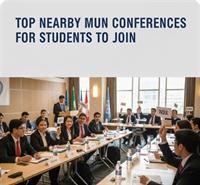
24-Dec-2025 Top Nearby MUN Conferences for Students to Join
-

27-Nov-2025 Global Voices Assemble India Next Big MUN Conference
-

13-Nov-2025 From Ideas to Impact Join the MUN India Workshop
-
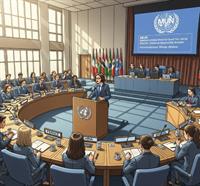
14-Aug-2025 What Is A Conference In MUN?
-

07-Aug-2025 What Does the MUN Do?
-

03-Jul-2025 Ways to Research for a Model UN Position Paper
-
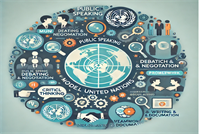
28-Mar-2025 What skills do you gain from Model United Nations?
